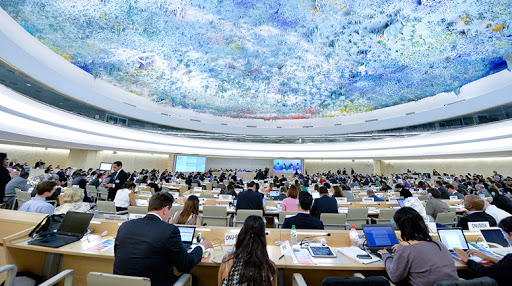Local LGBT-rights nongovernmental organization Rainbow of Macau has submitted a report to the United Nations Human Rights Committee in which it suggests for the international body to inquire local authorities on what legislative efforts are being made to avoid discrimination due to sexual orientation or gender identity in the SAR.
Using the results of its third Macau LGBT+ Survey, Rainbow of Macau founders Jason Chao and Anthony Lam on June 1 submitted a report on LGBT Equality to Human Rights Committee suggesting issues to be raised at its 129th session scheduled for June 29 to July 24 of this year.
“Rainbow of Macau decided to submit a report to the UN body because so far we have not seen any progress in terms of rights of transgendered people since about 2014, in addition to the restoration of protection for same-sex couples under the Domestic Violence Law. We believe the SAR government has the duty to construct an equal society for all, including LGBT+ people,” RM Director-General Anthony Lam, told MNA.
The report focuses on three main areas engrained in the International Covenant on Civil and Political Rights (ICCPR) that the association considered the Macau SAR had still to properly adhere to, namely: equality and non-discrimination; recognition of transgender persons’ gender marker; and domestic violence.
‘The constant jurisprudence of the HRC reaffirms that the prohibition against discrimination under article 26 of the ICCRC also comprises discrimination on the basis of sexual orientation and gender identity. In Macau, legal protection against discrimination is inadequate on sexual orientation ground and non-existent on gender identity ground,’ the report.
The association considered that under the local law, the LGBT community only enjoyed equal rights Currently, only over treatment of job seekers and employees by employers and treatment of people by the officers of the Commission Against Corruption.
‘Macau officials and some community leaders have, for a significant amount of repetitions, invoked the notion of ‘a lack of social consensus’ to respond to the call for equal rights for the LGBT people. RM observes that so-called ‘a lack of social consensus’ is no more than an excuse for the state party to evade the responsibilities of rectifying discriminatory laws,’ the report noted.
The recent survey conducted by the association showed that local LGBT+ respondents ‘overwhelmingly agree’ that the law and policy in the areas of housing, education, healthcare, public administration, gender recognition, and criminal law should be updated to provide equal or higher protection of the LGBT people.
Therefore the association asked for the UN body to inquire the Macau SAR govenrment to provide a list of laws that include a provision on the principle of equality or non-discrimination in which sexual orientation or gender identity is not a protected characteristic.
Rainbow of Macau also stated that when compared to heterosexual intimate partners, same-sex intimate partners are deprived of protection under the local Domestic Violence Law, with its recent survey showing that 22.1 per cent of respondents reported experiencing domestic violence perpetrated by intimate partners.
The association also noted that despite its appeals, the Macau government declined to reinstate a reference to same-sex partners in the final text of the Domestic Violence Law enforced in 2016.
On this matter, the NGO would like to the see UN body question local authorities to explain the non-compliance with the Committee against Torture’s recommendation that the Domestic Violence Law should be enacted without discrimination.
It also suggested local authorities should exemplify what training has been provided to frontline social workers and police officers concerning the detection of intimate violence between same-sex partner and to clarify whether or not the state party has the will to accord equal protection to victims of domestic violence without discrimination on the basis of sexual orientation.
Another issue that worried the LGBT rights group was the lack of adderhance to the HRC articles over the right for transgender people to change the gender marker on identity documents.
‘Since its founding, RM has received queries from a growing number of transgender people who had undergone a sex affirmation surgery, after which they wish to change the gender marker on their identity documents. RM has raised this issue to the competent government departments. However, the Macau government could not help them with the matter unless the law is revised to allow for such change,’ the group stated.
According to the group, although the Macau government announced in 2015 that the Legal Reform Consultation Committee was to commence a study about allowing transgender persons to change the gender marker on their birth records and identity documents since that announcement no more updates were given.
Therefore, the association suggested that Human Rights Committee asks for local authorities to provide a timeline for enacting necessary legislation to allow transgender persons to change the gender marker on their birth records and identity documents.
So far the UN body has also received documents from the Macao Youth Federation, Macau Conscience, and from the University of Macau Professor of Law Gabriel Tong Io Cheng concerning several human rights issues in the SAR.
In his submission, Professor Tong states that he Macau society ‘generally understands and accepts’ the LGBT community and that there have been no cases reported to the public of discrimination against LGBT groups in Macau.
The legal expert also stated that certain groups in Macau have attempted to promote the legislation of same-sex marriage but that these efforts had failed because of the ‘absence of the social consensus’.
Still, Professor Tong suggested that the Macau SAR government conduct more researches and dialogues in an inclusive manner, in order to reach broad consensus among residents, and protect the rights of LGBT groups more effectively.




















